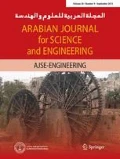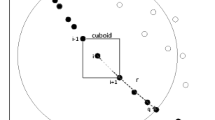Abstract
Multi-objective differential evolution (MODE) algorithm has been widely used in solving multi-objective optimization problems. In this paper, a hybridization technique is proposed to improve the performance of MODE algorithm in terms of speed and convergence. The proposed hybrid MODE-dynamic-random local search (HMODE-DLS) algorithm combines MODE and dynamic-random local search (DLS) algorithm. To evaluate the proposed algorithm and validate its performance, benchmark test problems (both constrained and non-constrained) are considered to be solved using MODE and the proposed HMODE-DLS algorithms. To compare between the two algorithms, five performance metrices are calculated, which are convergence, spread, generational distance, spacing and hypervolume ratio. Mean and standard deviation values for the performance metrics are reported, and the best in each category is highlighted. The Conv metric results of the new hybrid MODE are compared with other reported ones. Additionally, the effect of local search probability is studied for selected problems. In general, HMODE-DLS performance outshines, in terms of convergence and robustness, compared with other tested algorithms. HMODE-DLS is, generally, faster, and its results are of improved quality compared to MODE algorithm.










Similar content being viewed by others
References
Chiandussi, G.; Codegone, M.; Ferrero, S.; Varesio, F.E.: Comparison of multi-objective optimization methodologies for engineering applications. Comput. Math. Appl. 63(5), 912–942 (2012)
Deb, K.: Multi-objective Optimization Using Evolutionary Algorithms. Wiley, London (2002)
Gujarathi, A.M.; Babu, B.: Evolutionary Computation: Techniques and Applications. CRC Press, New York (2016)
Coello, C.A.C.; Lamont, G.B.; Van Veldhuizen, D.A.: Evolutionary Algorithms for Solving Multi-objective Problems, vol. 5. Springer, Berlin (2007)
Deb, K.; Agrawal, S.; Pratap, A.; Meyarivan, T.: A fast elitist non-dominated sorting genetic algorithm for multi-objective optimization: NSGA-II. In: International Conference on Parallel Problem Solving From Nature, pp. 849–858. Springer, Berlin (2000)
Zitzler, E.; Thiele, L.: Multiobjective evolutionary algorithms: a comparative case study and the strength Pareto approach. IEEE Trans. Evolut. Comput. 3(4), 257–271 (1999)
Coello, C.A.C.; Lamont, G.B.: Applications of Multi-objective Evolutionary Algorithms, vol. 1. World Scientific, Singapore (2004)
Khatibi, S.; Bafruei, M.K.; Rahmani, M.: Modelling a bi-objective airport gate scheduling with controllable processing time using hybrid NSGA-II and VNS algorithm. Int. J. Oper. Res. 34(1), 1–27 (2019)
Silva, A.S.D.; Ma, H.; Mei, Y.; Zhang, M.: A hybrid memetic approach for fully automated multi-objective web service composition. In: 2018 IEEE International Conference on Web Services (ICWS), 2–7 July 2018, pp. 26–33 (2018)
Wang, C.; Ma, H.; Chen, G.; Hartmann, S.: A memetic NSGA-II with EDA-based local search for fully automated multiobjective web service composition. In: Proceedings of the Genetic and Evolutionary Computation Conference Companion, pp. 421–422 (2019)
Zhang, M.; Wang, H.; Cui, Z.; Chen, J.: Hybrid multi-objective cuckoo search with dynamical local search. Memet. Comput. 10(2), 199–208 (2018)
Dulebenets, M.A.: An adaptive island evolutionary algorithm for the berth scheduling problem. Memet. Comput. 12(1), 51–72 (2020)
Fu, Y.; Wang, H.; Tian, G.; Li, Z.; Hu, H.: Two-agent stochastic flow shop deteriorating scheduling via a hybrid multi-objective evolutionary algorithm. J. Intell. Manuf. 30(5), 2257–2272 (2019)
Zhang, W.; Wang, Y.; Yang, Y.; Gen, M.: Hybrid multiobjective evolutionary algorithm based on differential evolution for flow shop scheduling problems. Comput. Ind. Eng. 130, 661–670 (2019)
Gujarathi, A.M.; Babu, B.V.: Multi-objective optimization of industrial styrene reactor: adiabatic and pseudo-isothermal operation. Chem. Eng. Sci. 65(6), 2009–2026 (2010)
Gujarathi, A.M.; Babu, B.: Optimization of adiabatic styrene reactor: a hybrid multiobjective differential evolution (H-MODE) approach. Ind. Eng. Chem. Res. 48(24), 11115–11132 (2009)
Babu, B.; Gujarathi, A.M.; Katla, P.; Laxmi, V.: Strategies of multi-objective differential evolution (MODE) for optimization of adiabatic styrene reactor. In: Proceedings of the International Conference on Emerging Mechanical Technology: Macro to Nano (EMTMN-2007), p. 243 (2007)
Gujarathi, A.M.; Babu, B.V.: Multiobjective optimization of Industrial processes using elitist multiobjective differential evolution (Elitist-MODE). Mater. Manuf. Processes 26(3), 455–463 (2011)
Gujarathi, A.M.; Babu, B.: Improved strategies of multi-objective differential evolution (MODE) for multi-objective optimization. In: IICAI, pp. 933–948 (2009)
Al-Siyabi, B.; Gujarathi, A.M.; Sivakumar, N.: Harmonic multi-objective differential evolution approach for multi-objective optimization of fed-batch bioreactor. Mater. Manuf. Processes 32(10), 1152–1161 (2017)
Sharma, S.; Rangaiah, G.P.: An improved multi-objective differential evolution with a termination criterion for optimizing chemical processes. Comput. Chem. Eng. 56, 155–173 (2013)
Xiao, J.; Wang, K.: Ranking-based elitist differential evolution for many-objective optimization. In: 2013 5th International Conference on Intelligent Human–Machine Systems and Cybernetics, pp. 310–313. IEEE (2013)
Dong, N.; Wang, Y.: Hybrid multiobjective differential evolution incorporating preference based local search. Int. J. Comput. Int. Syst. 7(4), 733–747 (2014)
Dong, N.; Wang, Y.: A hybrid multiobjective differential evolution algorithm based on improved e-dominance. In: 2011 Seventh International Conference on Computational Intelligence and Security, pp. 24–28. IEEE (2011)
Lin, Q.; Zhu, Q.; Huang, P.; Chen, J.; Ming, Z.; Yu, J.: A novel hybrid multi-objective immune algorithm with adaptive differential evolution. Comput. Oper. Res. 62, 95–111 (2015)
Tang, L.; Wang, X.: A hybrid multiobjective evolutionary algorithm for multiobjective optimization problems. IEEE Trans. Evolut. Comput. 17(1), 20–45 (2013)
Percus, A.; Istrate, G.; Moore, C.: Computational Complexity and Statistical Physics. Oxford University Press, Oxford (2006)
Onwubolu, G.C.; Babu, B.: New Optimization Techniques in Engineering, vol. 141. Springer, Heidelberg (2013)
Storn, R.; Price, K.: Differential evolution—a simple and efficient heuristic for global optimization over continuous spaces. J. Glob. Optim. 11(4), 341–359 (1997)
Babu, B.; Chakole, P.G.; Mubeen, J.S.: Multiobjective differential evolution (MODE) for optimization of adiabatic styrene reactor. Chem. Eng. Sci. 60(17), 4822–4837 (2005)
Babu, B.; Mubeen, J.S.; Chakole, P.G.: Simulation and optimization of wiped-film poly-ethylene terephthalate (PET) reactor using multiobjective differential evolution (MODE). Mater. Manuf. Processes 22(5), 541–552 (2007)
Reddy, M.J.; Kumar, D.N.: Multiobjective differential evolution with application to reservoir system optimization. J. Comput. Civ. Eng. 21(2), 136–146 (2007)
Gujarathi, A.M.; Babu, B.: Improved multiobjective differential evolution (MODE) approach for purified terephthalic acid (PTA) oxidation process. Mater. Manuf. Process. 24(3), 303–319 (2009)
Huband, S.; Hingston, P.; Barone, L.; While, L.: A review of multiobjective test problems and a scalable test problem toolkit. IEEE Trans. Evolut. Comput. 10(5), 477–506 (2006)
Zitzler, E.; Deb, K.; Thiele, L.: Comparison of multiobjective evolutionary algorithms: empirical results. Evol. Comput. 8(2), 173–195 (2000)
Rangaiah, G.P.: Multi-objective Optimization: Techniques and Applications in Chemical Engineering, vol. 1. World Scientific, Singapore (2009)
Michalewicz, Z.: A survey of constraint handling techniques in evolutionary computation methods. In: Proceedings of the 4th Annual Conference on Evolutionary Programming, pp. 135–155 (1995)
Yeniay, Ö.: Penalty function methods for constrained optimization with genetic algorithms. Math. Comput. Appl. 10(1), 45–56 (2005)
Zitzler, E.: Evolutionary Algorithms for Multiobjective Optimization: Methods and Applications, vol. 63. Citeseer, Zurich (1999)
Veldhuizen, D.: Multiobjective Evolutionary Algorithms: Classifications, Analyses, and New Innovations. Write-Patterson: Air Force Institute of Technology (1999)
Schott, J.R.: Fault Tolerant Design Using Single and Multicriteria Genetic Algorithm Optimization. Massachusetts Institute of Technology, Cambridge (1995)
Wang, Y.-N.; Wu, L.-H.; Yuan, X.-F.: Multi-objective self-adaptive differential evolution with elitist archive and crowding entropy-based diversity measure. Soft Comput. 14(3), 193 (2010)
Gujarathi, A.M.; Babu, B.: Hybrid strategy of multi-objective differential evolution (H-MODE) for multi-objective optimisation. Int. J. Comput. Int. Stud. 2(2), 157–186 (2013)
Fonseca, C.M.; Guerreiro, A.P.; López-Ibáñez, M.; Paquete, L.: On the computation of the empirical attainment function. In: International Conference on Evolutionary Multi-criterion Optimization, pp. 106–120. Springer, Berlin (2011)
Conover, W.: Practical Nonparametric Statistics. Wiley, New York (1999)
de Souza, T.C.; Goldbarg, E.F.; Goldbarg, M.C.: Comparing PSO and NSGA II for the biobjective oil derivatives distribution problem. In: IEEE Congress on Evolutionary Computation, pp. 1–7. IEEE (2010)
Deb, K.: Multi Objective Optimization Using Evolutionary Algorithms. Wiley, London (2001)
Funding
This work was partially supported by Sultan Qaboos University, Sultanate of Oman under Grant IG/ENG/PCED/19/01.
Author information
Authors and Affiliations
Corresponding author
Appendix
Appendix
Rights and permissions
About this article
Cite this article
Al Ani, Z., Gujarathi, A.M., Vakili-Nezhaad, G.R. et al. Hybridization Approach Towards Improving the Performance of Evolutionary Algorithm. Arab J Sci Eng 45, 11065–11086 (2020). https://doi.org/10.1007/s13369-020-04964-y
Received:
Accepted:
Published:
Issue Date:
DOI: https://doi.org/10.1007/s13369-020-04964-y





